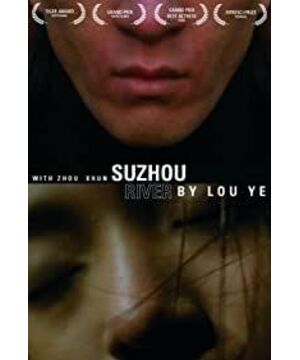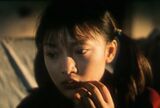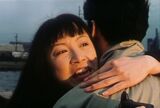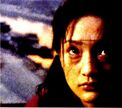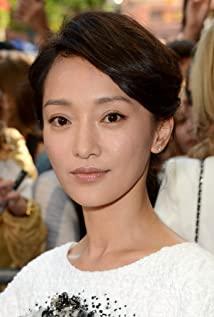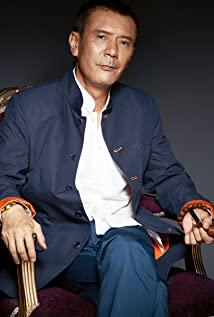But I still want to talk about that mermaid.
"About love, I want to say that I once saw a mermaid with blond hair. Don't believe me, I'm lying." This is the line in the opening shot.
The Suzhou River in the empty shot is crumbling and bleak. The gray Oriental Pearl in the distance is ambiguous and cruel. It is ostentatious to all the people living in Suzhou River, but when the film starts, I realize that this shot is also "me" at the same time. The first-person recording method. "I'm a photographer, I can shoot anything, weddings, parties, even you change clothes, go to the toilet, and have sex. But don't blame me if you feel bad, I told you already, I The camera doesn't lie." Then there is the "mermaid" that "I" saw - Meimei, followed by "our" love and the love between Ma and Peony (I will call these two parts love).
When I saw Peony was kidnapped and was about to jump into Suzhou River from the Waibaidu Bridge, and told Ma Ma that I would turn into a mermaid and come to you if I died, I suddenly realized that Lou Ye never wanted to tell a touching story. 's camera has been lying. There are all kinds of creatures on the Suzhou River, but there is no golden mermaid in the shot. Where did the two identical Meimei and Peony come from, and where did the vodka with bison grass come from?
The hand-held shots in the movie are superb, and the use of the blurred focus is just right for the jumping in the river and watching TV. The fixed shots on the motorcycle also use some close-up and long-range layered shots (such as Peony and the motor watching the Oriental Pearl together). Of course, the personal style and character settings of the editing in the film can reflect Lou Ye's characteristics. The narrative structure of "Two Lives of Flowers", the narrative method of Wang Xiaobo, and the role selection of the marginal survivors of society. Lou Ye never wanted to tell a touching story. In fact, what Lou Ye wanted to tell was the story of his own feelings. Their indifference is their own indifference, their anxiety is their own anxiety, their struggle is their own struggle. This is the main narrative.
Throughout the sixth generation of directors, there are both the objective style of "East Palace and the West Palace", the emotional narrative of "Sunny Days", the physical orientation of "Extreme Cold", and the self-consciousness of "Xiao Wu". , but the commonality of the sixth-generation directors is the main narrative, focusing on those individuals who are on the edge of the social system. They are perceptual, they are subjective, and perhaps many characters are not typical and not common (for example, in "Beijing Bastards" the thief in "Xiao Wu", the madman in "The Sun Also Rises"), but they all have the strong autobiographical, individual narrative and self-experience characteristics of sixth-generation films, and they quickly pay attention to those In the grand era, people and things that are ignored and marginalized, and even some topics that are taboo. And this will undoubtedly record the real possibility of affecting the story.
Meimei and Peony are the two sides of a symbol for listening to and being narrated. In the absence of the narrator, they instead create a purely aesthetic fictional essence. In the identity of a postman, the name has the influence of a motor that keeps turning. , the story appears one after another psychedelic and pure love and hate, the kidnappers kill each other for money, the Century Happy Pavilion is closed, and the motor is still full of galloping blood looking for peony. The motor is like a never-ending engine, but in the end the motor dies. All the images in the director's mind are refracted and reflected by complex optical lenses, and finally projected onto the screen, which is the mermaid like that poem. "Suzhou River" was once called a "ghost movie" because of its dream-like lyrical style, but the director just recorded the confusion, confusion, confusion, helplessness and the one in the vast snowy field in an era when rationality was absent. The possibility of a little red hope. Teacher Yang Chi from the School of Journalism of our school once made a documentary called "Waiting for Winter", which asked people's concept of happiness and living conditions in this great era. The theme is to record the possibility of reality.
"Suzhou River" is full of loneliness, anxiety and gray sky and river. The comment on winning the Golden Lake Award at the Rotterdam International Film Festival is "for the film's experiment in the form of film narrative, and for the film to successfully awaken those in modern times. Lost people in the city." The director's indictment of a city that lost and even devoured people shows his deep love for the city.
The characters in Suzhou River are deconstructed, the lyricism is poetic, and the attitude is ambiguous. The scene of Zhou Xun changing clothes appeared repeatedly, full of body smell. The deliberate description of the category of sexuality shows a loving attitude towards life itself, a concern for self, and a silent resistance to reason.
Lou Ye explained "Suzhou River", ""Suzhou River" is not a language about a life's dual life style, but a spiritual drifting story of a modern man looking for lost love. Brigade - Kielovsky's film ("Referring to "The Two Lives of Flowers", including his "Ten Commandments", the style of the Color Trilogy - Dog Meat Note) is more of a metaphysical life experience, while my film It still runs through the search.
The main narrative is always the best medicine to deceive people.
Meimei said to Ma Ma who had never met before: "Who are you looking for? "
Ma said: "I'm looking for you. "
Probably such a love story will never happen.
It is said that "Suzhou River" was banned because it was first released in Taiwan, but I prefer to believe it is because this main narrative style is really unhealthy and unsuitable for viewing. It is too easy to confuse us. Introducing the abyss of loss, in fact, we can never design love. Every scene of Suzhou River in the movie can be found in Shanghai, but it is not the Suzhou River in the movie, it is mine. So there are only cameras in Century Happy Museum, There is no Meimei; it's just me by the Suzhou River, not you and
the mermaid. It's like I'm telling my own story, and my camera has lied from the beginning, we are all the same.
View more about Suzhou River reviews


